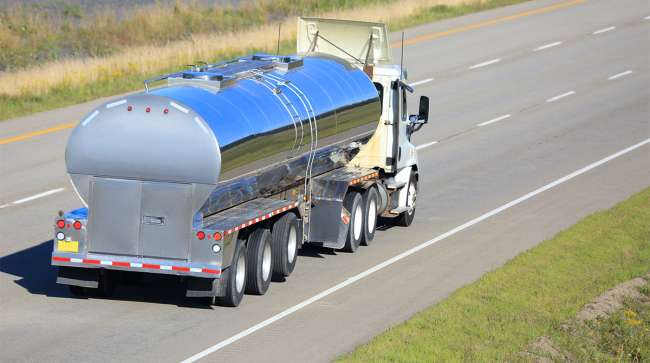Staff Reporter
New Overweight Hauling Law Helps Wisconsin Cheesemakers

[Stay on top of transportation news: Get TTNews in your inbox.]
Wisconsin cheesemakers and the state’s trucking association are applauding the passage of a new law that boosts hauling capacity for dairy farmers, offering the state’s agricultural industry cost savings and easing the pressure of driver shortages.
“The new law is necessary to allow haulers to move additional milk and liquid whey product from farms to processors with fewer trips, trucks and drivers,” said Dan Johnson, vice president of the Wisconsin Motor Carriers Association and administrator of its Wisconsin Milk Haulers Association. “There is a significant driver shortage. Thus, the ability to haul heavier loads will reduce the need for additional drivers in the milk hauling industry.”
Wisconsin Gov. Tony Evers on March 21 signed a bill creating a new oversize/overweight permit for hauling milk products and liquid whey in the state. Among bill supporters were WMCA/Wisconsin Milk Haulers Association and the Wisconsin Cheese Makers Association.
With production of 600 varieties of cheese, Wisconsin leads the nation in cheese production, turning out more than double that of runner-up California, according to the state tourism department. It also noted that the average American eats 27 pounds of cheese yearly.

Johnson
“Hauling tanks at full capacity is safer than hauling tanks with partial loads. A number of our neighboring states currently allow for additional weight for milk and liquid whey products, and as ‘America’s Dairyland,’ we cannot afford to competitively fall behind,” Johnson said. “We believe an increase in weight capacity will lead to a 15% to 20% reduction in shipments each year, which is good for our roads, public safety, the environment and the dairy industry as a whole.” He noted that a $150 million state investment in road improvements for the agricultural sector will further strengthen the state’s dairy businesses.
The increased hauling capacity for liquid milk byproducts such as whey expands business opportunities since whey is critical for making cheese and can be processed into protein powder for other products. Whey powder and whey protein concentrate, for example, are used in processed meat, sausages, health foods, baby food and formula, beverages and sweets.
“Dried whey represents a significant commercial opportunity for Wisconsin dairy processors, comprising 31% of all the state’s dairy sales abroad,” notes the Wisconsin Cheese Makers Association. “Due to the complexity and cost of drying, however, whey is typically hauled from cheese-making plants in liquid form for additional processing.”

Sweeney
Rebekah Sweeney, the Wisconsin Cheese Makers Association’s senior director of programs and policy, noted that the Wisconsin Department of Transportation began issuing hauling permits under the new law in June.
“Already, WisDOT has issued 17 of the new permits, and each one offers a positive ripple effect across the Dairy State, supporting farmers, haulers and processors,” she said. “Dairy processors have made it clear that the permit will alleviate labor constraints, support their most economical operations, and enable them to haul liquid dairy in the most sustainable way possible.”
She noted that association member company Milk Specialties Global expects to reduce shipments by 15%, equal to about 8,580 over-the-road miles for its fleet.
“Another WCMA member, BelGioioso Cheese, estimates it will reduce the amount of fuel it uses each year by 29,000 gallons and its overall carbon dioxide emissions by 258 metric tons per year,” Sweeney added.
WisDOT under the new law can issue annual or consecutive month permits for transporting fluid milk products in vehicle combinations exceeding maximum gross weight limitations, subject to other requirements. Fluid milk products are raw milk/liquid, milk products and byproducts, including liquid whey and whey byproducts.
Want more news? Listen to today's daily briefing above or go here for more info
Randy Klein, transportation director at Milk Specialties Global, said the company had 1,100 inbound/outbound liquid tanker shipments per week across its Wisconsin-based plants and whey suppliers for transporting and processing liquid dairy products. Using fewer trucks can help reduce vehicle wear and tear, and creates transportation efficiencies. Another advantage is drastically reducing water used to wash trucks.
“Consider a conservative scenario in which just 50% of our trucks require a washout between hauls, as some can haul more than one load before rewashing. Even at just half needing a wash, that’s 4,290 less washes per year. At 1,500 gallons of water per wash, that is 6,435,000 gallons of potential water savings,” Klein declared.
Wisconsin has over 1 million cows, or about one for every five residents, and 90% of the state’s milk is made into cheese.

